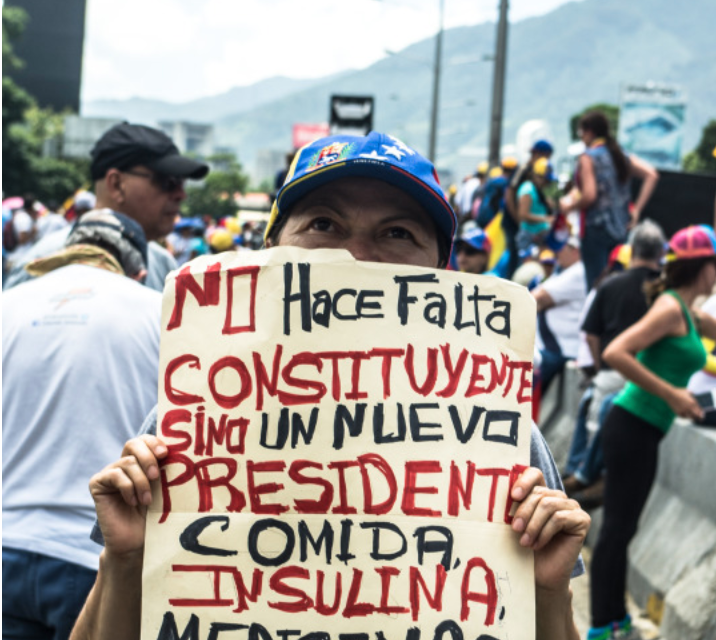Woman protesting in Caracas. © Rodrigo Romero
On July 2, in an event called “The Great National Agreement,” president of the National Assembly, Julio Borges convoked a plebescite for Sunday, July 16. He based his call on articles 5, 71, 333 and 350 of the 1999 Constitution.
Borges presented a document titled “Let the people decide” (Que sea el pueblo quién decida) which contained the main points of the initiative and argued that it is “based on our Carta Magna, we want it to be the people who reject the Constituent Assembly.”
On July 5, the Plebescite was voted upon by the National Assembly. The AN agreed upon the following questions.
- Do you reject or refuse to recognize the realization of a constituent assembly proposed by Nicolás Maduro without the prior approval of the people of Venezuela?
- Do you demand that the Armed Forces and all public officials obey and defend the 1999 Constitution and back the decisions of the National Assembly?
- Do you agree with the need to procede with the renewal of public powers in accordance with the Constitution and the realization of free and transparent elections, as well as the formation of a National Unity government to restore the Constitutional order?
The following day a number of civil society groups announced the creation of the Liberator Movement, and initiative aiming to promote the realization of the plebiscite. The movement brings together student government groups from Venezuela’s private and autonomous public universities, as well as the Engineers Association, the Lawyers Association, and NGO Foro Penal Venezolano and Broad Social Front.
Government calls plebiscite unconstitutional
Venezuelan president Nicolás Maduro said any popular consultation organized outside of Venezuela’s Electoral Power is unconstitutional. He suggested that to call any kind of binding referendum or consultation it is necessary to fulfill a specific set of requirements and mechanisms.
Progovernment constitutional legal scholar Hermán Escarrá says that the plebiscite convoked by the MUD “is not contemplated in the 1999 Constitution.” Rather there is such a thing as a “consultative referendum, which is provided for by the Constitution and the procedure would be to go to the National Electoral Council (CNE) to solicit its convocation.”
Socorro Hernández, a rector of the CNE suggested that the plebiscite convoked by the opposition for July 16, will not be valid. “The ability to convoke elections, consultations, and referenda belongs to the Electoral Power. There is no other institution or facto that has this among its competencies. As such, for any consultation to be valid, it must be carried-out by the Electoral Power.”
Critical Chavismo Considers Plebiscite Legitimate
The former ombudswoman Gabriela Ramírez, along with other dissenting Chavistas, called on the people to reject Maduro’s initiative. “We are against the National Constituent Assembly and the derogation of a Constitution that we have all approved.”
Chavista National Assembly deputy Germán Ferrer, husband of the Attorney General Luisa Ortega argues that the National Assembly’s actions are entirely legitimate.
Nicmer Evans, a critical Chavista who recently withdrew from the party Marea Socialista in order to be able to try to bridge dissident Chavismo and the opposition agreed with the initiative “as long as it takes place in a transparent way,” because it is “legitimate, legal and constitutional.”
However, he is critical of the three questions which he says are not oriented towards mobililzing the participation of Chavistas. He suggested that “the three questions should be reduced to one very clear question: Do you agree with the Constitutional Assembly?”
Opposition support
Unsurprisingly, activists and opinion makers allied with the opposition have voiced vigorous support.
Alfredo Romero, Director of Foro Penal Venezolano argued that the plebiscite is a way for the people to participate directly in political decisions. “The plebiscite is a peaceful response to the Constitutional Assembly…Popular sovereignty resides with the people and the President can’t assume that soveriengty and make decisions behind the backs of the people.”
Román Duque Corredor, former justice of Venezuela’s Supreme Court (since renamed the Supreme Justice Tribunal) says the plebiscite is valid for the restitution of democratic legitimacy in the country. “As citizens we are all enabled to exercise our political rights, among those is the popular consultation, as well as a consultative referendum.”
Lawyer and former TSJ justice Jorge Rosell, who also coordinates the Front for the Defense of the Constitution and Democracy argues that the figure of a popular consultation and it does not depend on the intervention of the CNE since the latter is governed by a law inferior to the Constitution. As a result it cannot impede it. “Any citizen can organize in their community a consultation about an idea. The plebiscite is simply the act of asking people what they want.
Complications
July 16th is guaranteed to be eventful. Beyond the logistic difficulty the opposition faces in carrying out a nationwide plebiscite, the government is going to do what it can to complicate it. The CNE has already announced that it is going to use July 16 to carryout a trial run of the ANC election nationwide.
Socialist National Assembly member Pedro Carreño has also called on the TSJ to suspend the plebiscite.



